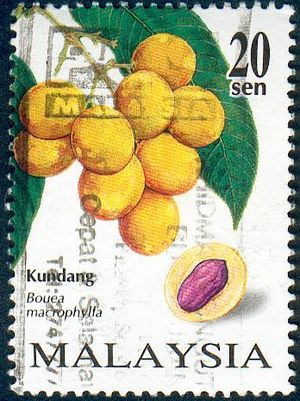Bouea macrophylla
Bouea macrophylla
Griffith
| Order | Sapindales |
|---|---|
| Family | Anacardiaceae |
| Genus | Bouea |
2n = 42
Origin : Sumatra, Java,
peninsular Malaysia
cultivated
| English | {{{english}}} |
|---|---|
| French | {{{french}}} |
Popular names
| English | marian plum, gandaria, plum mango |
| French | gandaria, maprang |
| German | Gandaria |
| Dutch | gandaria |
| Indonesian | ramania, gandaria (Java, Sunda) (PROSEA) |
| Malay | kundang, rembunia, setar (Kedah) (PROSEA) |
| Pilipino | gandaria |
Description
The fruit is harvested in February-May in Thailand, and March-June in Indonesia.
Classification
Bouea macrophylla Griffith (1854)
synonym:
- Bouea gandaria Blume ex Miq. (1859)
Cultivars
The species was traditionally multiplicated by seed. Improved cultivars are now multiplicated vegetatively by layering or grafting. Three groups are distinguished in Thailand:
- Prew Group, with very acid fruits, corresponding to the wild type. In Borneo, the cultivar 'Hintalu' is grown.
- Mayong Group, with slightly acid fruits, is grown and popular in Thailand. The best known cultivar is 'Chid'.
- Wan Group, with sweet fruits, is the most grown, and is exported. The best known cultivar is 'Ta It', bred more than a century ago. In Borneo, 'Ramania Pipit' and 'Ramania Tembai' are grown.
History

Malaysian stamp from Pierre Guertin
Exported by Thailand to Europe
Uses
- fruit, mature: edible whole (with the peel), sweet with a light mango taste. The combination of bright orange flesh and mauve seed makes it very attractive.
- fruit, immature: edible in fruit salad or condiments
- seed: cotyledons edible, but endosperm bitter
- leaves, young: locally eaten raw or cooked
- tree planted a shade tree
References
- PROSEA 2, 1991. Plant resources of South-East Asia. vol. 2. Edible fruits and nuts. ed. by E.W.M. Verheij & R.E. Coronel. Wageningen, PUDOC/PROSEA. (Bogor, PROSEA, 1992). 447 p.
- Subhadrabandhu Suranant, 2001. Under-Utilized Tropical Fruits of Thailand. Bangkok, FAO. ma-praang